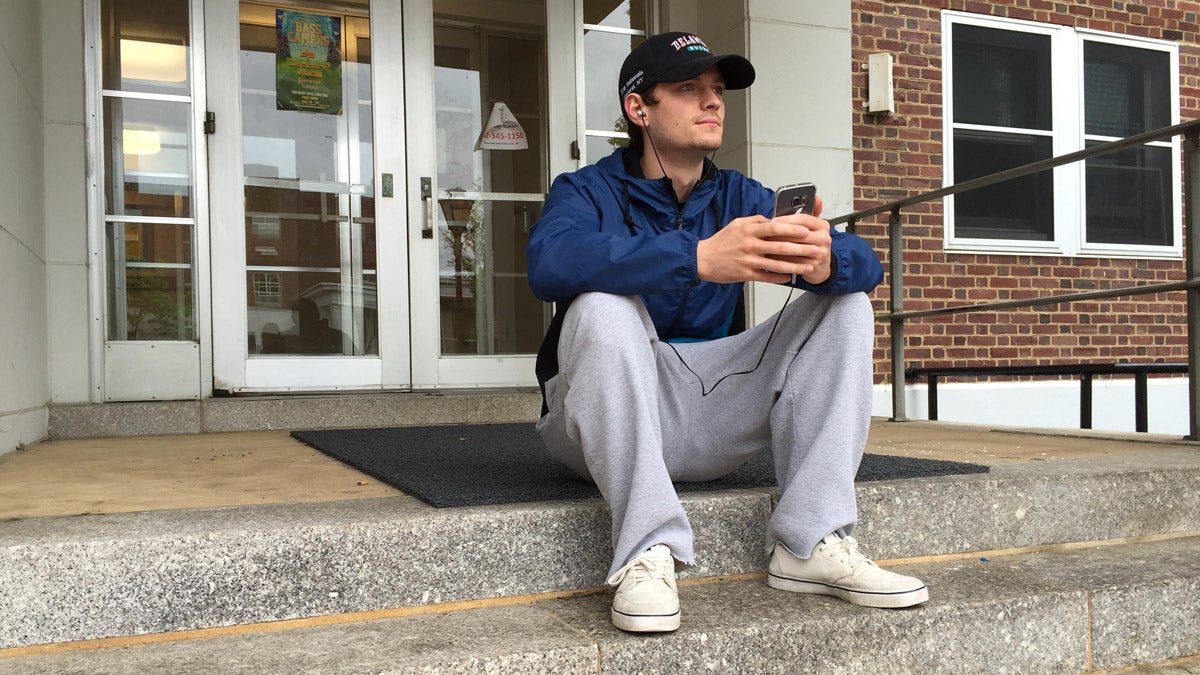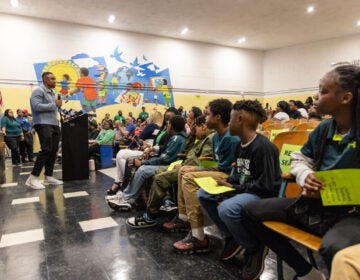First Year, First Generation: Overwhelmed by demands, buoyed by encouragement
Listen
Sean Ryan sits on the stoop of his University of Delaware dorm
This is the sixth story in our First Year, First Generation series. For an introduction, click here. You can listen to Part 2, Part 3, Part 4 and Part 5 by clicking on the links.
Sometimes, Sean Ryan shuts down.
It happened a little more than a month ago when the University of Delaware freshman caught a first glimpse of his finals schedule. Something about seeing all those exams stacked one after the other sent him into a spiral. He knew he should leap into action — study, ask for help, do something.
“Instead of just being like, ‘All right, it’s time to start right now and like get to work,’ I came out here and sat here and did absolutely nothing for three hours,” said Ryan.
Here is a small stone stoop outside his dormitory. It faces a campus walkway and Ryan likes to watch people amble past. Early in the school year, Ryan’s friends would gather on the portico to smoke cigarettes. He’d join them for the company. As time passed he found himself lingering longer and longer — well after his friends had retreated indoors.
“I think I’m just gonna sit here for a while,” said Ryan. “I’ve come to like it, like it a lot.”
On the night of his finals freak out, he listened to an entire album: “Doris” by the rapper Earl Sweatshirt. Hours drifted past. He didn’t study. He didn’t move.
By his own admission, Ryan hasn’t adjusted well to college. It’s not that he’s had any dramatic setbacks. Instead. it’s that little setbacks — a bad test score, a heavy load of homework — have this way of mushrooming.
“The world seems so much bigger, and you seem so much smaller,” said Ryan. “That’s the best way for me to put it.”
‘Should I even go to classes? Should I try?’
Almost as soon as he enrolled, Ryan flirted with the idea of leaving the University of Delaware. Sometimes he thought about transferring. He even applied to a handful of colleges around the country. Early in the year, he kept up a correspondence with a military recruiter. Ryan has long dreamed of joining the Navy.
Just as often, though, he thought about dropping out entirely.
“First semester, I was 100 percent set on dropping out after spring semester,” said Ryan. “I didn’t care. I just hated it so much, I wanted to go do something else.”
Again, it’s not as if Ryan has had any dramatic failures at college. His first semester he had nearly a B average. I asked Ryan why — why does it always feel like he’s on the verge of quitting? And he went somewhere I did not expect. He started talking about himself in middle school.
“I had no idea I wanted to go to college. It wasn’t going to happen,” Ryan recalled. “This is a weird story, but, in eighth grade, I almost thought I could drop out of school. I was like I have a job right now and I can make good money.”
Ryan’s story goes like this: He was a bad kid, not openly rebellious but deeply uninterested in school. A friend floated the idea of selling marijuana and ecstasy. He bit. For almost a year, he was an eighth-grade drug dealer making about $200 a week. He spent most of the money on kid stuff — fancy bike parts and the like. But as the money came in, he grew more and more convinced he didn’t need school. It just wasn’t for him.
Ryan soldiered through ninth grade. He gave up the drug dealing, but his apathy for school endured. In 10th grade, his new girlfriend suggested he apply for a program she’d recently joined called AVID. He joined in 11th grade, and his life took a sudden turn.
A dramatic change
Advancement Via Individual Determination is a college-readiness program that came out of San Diego in 1980 and has since spread across the country. The basic idea is to provide middling students with the study skills and teacher support they’ll need to attend college.
A.I. duPont High School just outside Wilmington started its program during Ryan’s 10th-grade year. The school selects a group of sophomores based on teacher nominations, and the class meets every other day until the students graduate.
As soon as Ryan joined, the school’s AVID teacher, Beth Schwartz, was on him. She knew about his absences. Knew his grades. Prodded him to take tougher classes. And Ryan responded.
“He wanted to be successful,” Schwartz said. “He was willing to let me ‘take over his life’ and be on top of him and remind him and help him. I just loved the kid.”
The AVID program has a curriculum and Schwartz would work with the students on targeted skills, such as time management. But Schwartz said her most important task was taking students who didn’t think college was a possibility and making them believe it was within their reach.
“That’s the biggest piece,” said Schwartz. “It’s not about teaching them that 2+2 equals 4. It’s letting them know that I believe in them.”
For Sean Ryan, this type of encouragement changed the entire way he thought about his future. When he talks about going to college there are two distinct periods in his life: before Ms. Schwartz and after Ms. Schwartz.
By contrast, the other four students in our first-generation project told me they planned to attend college as long as they could remember. Some combination of internal drive and parental expectations put them on the path when they were early.
Take Jada Smack, a student at Swarthmore College. When I asked her why she never considered dropping out, she looked almost puzzled.
“I don’t know,” she said. “That just doesn’t seem like an option to me.”
Then, like Ryan, she started talking about middle school.
“I really remember being in sixth grade thinking like, ‘Oh my God. I have to have perfect attendance and get all these good grades because colleges can look back as far as they want to,’” she recalled. “You know how they brainwash you when you’re a little kid to make you, like, do good in school? It worked on me.”
Lingering influence, doubts
But it didn’t work on Ryan. His was more a conscious decision later in life to attend college. And so when I asked him about dropping out, he always came back to Ms. Schwartz.
“Ms. Schwartz kinda talked me into going to college, and I said, ‘All right, I’ll give it one year. And if I like it, I’ll stay,’” said Ryan. “So the whole time, I’m like, I don’t know if I like it that much.”
In 1997 the federal government’s National Center for Education Statistics released a study on students’ higher-ed plans. The researchers asked students once in eighth grade and again in 12th whether they expected to go to college. Responses changed little in the intervening years.
Nearly 73 percent of students in eighth grade expected to attend college. By the time that same cohort graduated, 71 percent anticipated enrolling in higher ed. Also of note, responses were pretty uniform among racial groups. Black eighth-graders and their white counterparts, for instance, had similar expectations of college attendance.
Real differences emerged, however, when researchers broke the cohort down by their parents’ highest level of education. Among eighth-graders whose parents completed college, 91 percent expected to attend college themselves. Compare that with 54.9 percent for eighth-graders whose parents never attended college.
Beth Schwartz has plenty of experience trying to alter students’ mindset when it comes to college. She knows it isn’t easy. For students like Sean Ryan, the belief that you belong in college doesn’t work like a light switch. You can’t just turn it on one day and expect it will stay that way forever.
“Since it wasn’t in him since he was a little boy, he’s always gonna question: Can I do this? Can I do this,” she said.
One day I asked Ryan if he thought he could ever shed this notion that he wasn’t destined for college. He paused a half-beat before answering.
“I think that’s going to be with me until I finish this,” he said.
WHYY is your source for fact-based, in-depth journalism and information. As a nonprofit organization, we rely on financial support from readers like you. Please give today.





